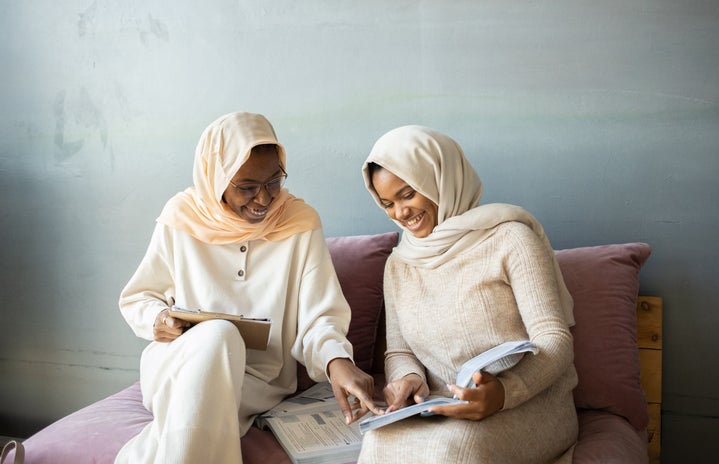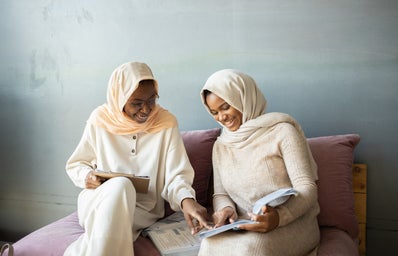What is it? Dos & Don’ts and How to be an Ally
As we spring into the Spring season, many changes are coming our way. Most of us college students are preparing for final exam season—yikes—however, a lot of us are also looking forward to summer and all the fun it brings. And for Muslims, most are looking forward to Ramadan. Sound familiar? While you might have heard of Ramadan, I’m sure you have some questions, so this article shares my personal experiences and attempt at explaining the meaning behind this holy month, and a guide of how to be supportive for your Muslim friends/community.
This year, Ramadan will start on April 2nd, 2022. This is because the Islamic calendar follows a lunar calendar, which is tied to the moon phases, and therefore shifts each year; meaning the month comes a little earlier each year. The month of Ramadan is a holy month that Muslims dedicate to prayer, charity, purity, and community. The essential point of Ramadan is fasting.
What Is Fasting?
The Islamic definition of fasting is to abstain from food, drink and sexual activity daily from dawn to nightfall. Yes, even water.
Practicing Muslims will usually wake up before sunrise (around 5 a.m.) to eat a very early breakfast before their daily fast begins. We will then go on with our day without any food or drink until sundown (around 7 p.m.). While most people are familiar with the abstinence of food, fasting is so much more than that. We are also supposed to abstain from negative emotions, such as anger, cursing, or simply being rude. This is because the holy month is intended to purify oneself, and so we are expected to be on our best behavior.
The purpose of abstaining from food/drink is self-discipline along with developing empathy and remembering to be grateful. When most of us are hungry during our fast, we simply wait for the clock to hit 7 p.m. However, for many living in poverty or struggling, they may not know when their next meal is. Fasting humbles us and reminds us how blessed we are. This is evident as charity and volunteering tend to skyrocket during this time in Muslim countries.
Fasting is so important to Muslims because it is one of our five essential pillars of Islam. Fasting is a must for those that are capable. This brings me to a very important point: not every Muslim will fast.
There are many reasons a practicing Muslim may not be fasting. One very common reason is that women are excused from fasting during their periods. I can definitely count a few very awkward interactions when someone has asked me “Aren’t you supposed to be fasting?” So unless you want to hear me explain that my private parts are currently bleeding, please don’t ask.
I’m just kidding, of course. Questions are always welcome, just make sure to ask respectfully!
Other reasons one might not fast include health conditions and age. It is typical for kids to only fast a few hours each day as a form of “practice,” since they are not yet mature enough to be held accountable. Some people are on medications or diets for their health and may feel upset that they can’t fast, remember to be considerate in your choice of words.
How To Be An Ally
Wish your Muslim friends a Happy Ramadan!
It means the world and beyond to me when someone recognizes my holidays, as a minority. It is all too common to hear “Merry Christmas,” and for us Muslims, sometimes we celebrate on days that other people aren’t even aware might be special to us. “Ramadan Kareem” is an Arabic saying that’s commonly used and it simply means “Generous Ramadan,” so you can also use this if you want some bonus points. :)
Another helpful thing would be to make a mental note to not invite us to lunch/morning coffee or offer us food. Of course, things slip our minds, but if you’re able to make a mental note, switch the invite to dinner instead. One of the most considerate things my friends did was switch our hangouts to evening time instead of afternoon, so I’d be able to snack and watch movies with them.
To Eat in front of a Muslim or To Not
This is completely up to you, and there is no right answer.
I would say most people I’ve met do not mind if you snack or drink around us because we understand you are not fasting. It would be different maybe if someone was to pull out a whole meal and dig in, but that’s why most of us avoid the cafeteria during this month. In fact, Muslims get good deeds for holding their fast while someone is eating nearby. Personally, I’d advise you to maybe ask your friend what they are comfortable with. The first few days are the hardest for us, but a week in, my stomach starts to adjust, and fasting becomes much easier.
My Experience
I love it. People look at me weird when I say I’m excited for Ramadan, as truthfully it is a struggle to fast, but the feeling is immaculate.
It can be hard to celebrate Ramadan away from family. Personally, I wish I could be back home in Egypt for it. It is beautiful when the whole country celebrates together. The city is lit up and decorated, shops are open late into the night and everyone is hustling around for dinner parties/get-togethers.
It warms my heart to see all the charity and volunteering during this time too. Everyone truly aims to give back to their community. I have fond memories of seeing many long tables being set up in public parks, and people huddled around helping set up dinner for the homeless.
There are even special Ramadan TV shows, which are 30 episodes each. Almost every actor/actress has one, they range in all categories, and they help us pass time as we fast. As a kid, I really enjoyed watching Ramez Galal, a famous Egyptian prankster who airs a prank show staring a plethora of celebrities every Ramadan.
In conclusion, Ramadan is what you make it. It’s an amazing time to reflect and work on yourself. It reminds us to be grateful and kind. Ramadan Kareem!


